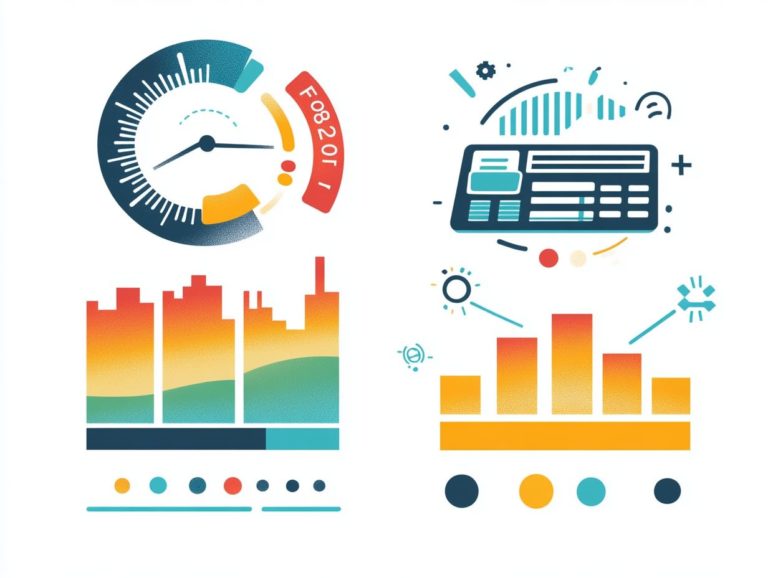How Student Loans Affect Your Credit Score
Credit scores are pivotal to your financial well-being. They affect everything from loan approvals to interest rates. For many individuals, student loans represent a substantial piece of this financial puzzle.
Understanding how student loans influence your credit score both positively and negatively is vital for effective financial management.
This article delves into the nuances of credit scores. It examines the specific impacts of student loans, strategies for responsible repayment, and the repercussions of default.
Explore these insights to empower yourself in navigating your financial future!
Contents
Key Takeaways:

- Student loans have a significant impact on your credit score, both positively and negatively.
- Responsible repayment strategies, such as making on-time payments and avoiding default, can help improve your credit score.
- Defaulted student loans can have serious consequences on your credit score and overall financial health. However, there are solutions available to help manage them.
Understanding Credit Scores
Understanding credit scores is essential for you, especially if you re a borrower looking to secure student loans. A strong credit score reflects your responsible credit history and plays a significant role in determining your loan eligibility, interest rates, and repayment plans.
Key factors like on-time payments and credit utilization shape your credit profile. Credit utilization is the percentage of your total credit that you’re using.
This makes it crucial for you to actively monitor and manage these components to optimize your financial standing.
What is a Credit Score?
A credit score serves as a numerical representation of your ability to manage credit. It is shaped by the details within your credit report, including your payment history and outstanding debts.
Various scoring models exist, with FICO and VantageScore being among the most prevalent. Each model evaluates different factors, resulting in slight variations in scores.
Grasping these systems is crucial for making informed financial decisions. A higher score can unlock better interest rates on loans and credit cards.
A lower score may impede your access to favorable terms. Therefore, it’s essential for you to monitor your scores regularly and rectify any discrepancies to uphold a robust credit profile.
Factors that Affect Credit Scores
Several key factors influence your credit score. Payment history is a major component; consistently making on-time payments signals to lenders that you are reliable.
Credit utilization also plays a significant role. Ideally, keeping it below 30% can give your score a boost.
Additionally, having a diverse credit mix such as a blend of revolving credit cards and installment loans can showcase your financial versatility.
It’s also important to monitor the number of credit accounts you open and inquiries you make. Too many applications in a short span can raise red flags.
Regularly reviewing your credit reports for accuracy is vital in maintaining a healthy credit profile.
How Student Loans Impact Credit Scores
Student loans can profoundly influence your credit score. They play a vital role in shaping your overall credit history.
When you make on-time payments on your student loans, you bolster your creditworthiness. Conversely, late payments can diminish your score and impact your future loan applications.
Don t wait! Start monitoring your credit score today to ensure you are on the right path towards financial stability!
Positive and Negative Effects

Student loans can have both positive and negative influences on your credit score. Consistent, on-time payments enhance your creditworthiness. In contrast, late payments can cause serious damage.
When you make timely repayments on your student loans, you showcase your financial responsibility and reliability to credit bureaus. This can significantly boost your credit score and open doors to better loan terms in the future, such as lower interest rates or higher credit limits.
On the flip side, defaulting on your loans or missing payments can lead to a dramatic decline in your credit score. This complicates your ability to secure other forms of credit. Keep in mind that missed payments can linger on your credit report for up to seven years. This highlights the long-term importance of maintaining a solid repayment history.
Managing Student Loans to Improve Credit Score
Effectively managing your student loans is crucial for enhancing your credit score. This involves strategies like tracking your payments, choosing suitable repayment plans, and understanding your options for loan modifications or rehabilitation.
Each step you take in this process can significantly influence your financial health and future opportunities.
Strategies for Responsible Repayment
Adopting strategies for responsible repayment, such as setting up automatic payments or using deferment which allows you to temporarily pause payments during financial hardships can enhance your credit score over time.
Regularly communicating with your loan servicers can help you explore income-driven repayment plans that fit your financial situation. This proactive approach not only aids in managing your monthly payments but also keeps you informed about available relief options.
Establishing a budget specifically for loan repayments helps prevent falling behind. Also, making extra payments whenever possible can reduce overall interest costs.
Set reminders for payment due dates to maintain a consistent payment history. This consistency is essential for your financial health. Stay informed about changes in federal loan policies. This knowledge can help you manage your student loans more effectively!
Dealing with Defaulted Student Loans
Navigating the complexities of defaulted student loans can lead to significant repercussions. These include a negative impact on your credit score and restricted access to future funding opportunities.
However, you have options! Exploring solutions like loan rehabilitation and understanding your borrower rights can pave the way to a more favorable financial future.
Consequences and Solutions
The repercussions of defaulted student loans can be severe, leading to significant drops in your credit score and potential garnishments. Fortunately, options like loan rehabilitation exist to help you restore your creditworthiness and reclaim your rights as a borrower.
Falling behind on your student loans may lead to a host of financial challenges that extend beyond a lower credit score. These challenges can escalate into increased interest rates, difficulty securing new credit, and even impact your job prospects. Many employers check credit during the hiring process.
To alleviate these issues, explore options like income-driven repayment plans, which provide manageable payment alternatives. Additionally, loan consolidation can be a pathway to relief. Don’t hesitate to seek assistance from credit counseling services. They empower you to regain control over your financial future and help you build a stronger foundation moving forward.
Other Ways Student Loans Can Affect Your Finances

Student loans affect more than just your credit scores; they play a significant role in shaping various aspects of your financial landscape.
Notably, they influence your debt-to-income ratio, a critical metric that lenders consider when assessing your eligibility for future loan applications.
Impact on Debt-to-Income Ratio
The presence of student loans can significantly affect your debt-to-income ratio a key metric lenders check to understand your financial health and ability to manage additional loans.
This ratio compares your total monthly debt payments to your monthly income, allowing lenders to assess the risk of extending further credit. Keeping your ratio manageable is key to unlocking future opportunities!
To effectively manage this ratio, consider implementing these strategies:
- Make extra payments toward the principal of your student loans,
- Explore income-driven repayment plans to lower monthly payments,
- Increase your income through part-time jobs or internships.
By actively addressing your debt-to-income ratio, you can boost your creditworthiness, making it easier to achieve your financial goals.
Effect on Future Loan Applications
Existing student loans can influence your future loan applications, as lenders carefully evaluate your credit score and overall debt management when determining funding options.
The presence of student debt may raise red flags for potential lenders, especially since it impacts your debt-to-income ratio a critical factor in assessing risk. Financial institutions pay close attention to how well you manage your existing obligations before extending new credit.
To enhance your credit profile, focus on making timely repayments. You should also explore consolidation or refinancing options for lower interest rates. Maintain a diverse credit mix by responsibly using credit cards to positively impact your scores and present a favorable financial picture to lenders.
Frequently Asked Questions
How Student Loans Affect Your Credit Score
Student loans can have a major impact on your credit score, which is why it’s important to understand how they can affect your credit. Here are some commonly asked questions about this topic.
How do student loans affect my credit score?
Student loans can have both positive and negative effects on your credit score. Making on-time payments can help improve your score. Conversely, missed payments or defaults can harm it.
Will my credit score be affected if I have student loans in deferment?
If your loans are in deferment, you are not required to make payments yet. This will not negatively impact your credit score as long as your loans are in good standing and you don’t miss any payments.
What happens to my credit score if I default on my student loans?
Defaulting can significantly damage your credit score. It will be reported to credit bureaus and can remain on your credit report for up to seven years, making it hard to get approved for credit in the future.
Can paying off my student loans improve my credit score?
Yes, making on-time payments and paying off your loans can enhance your credit score. This demonstrates responsible credit use and can lead to a score boost.
How long do student loans stay on my credit report?
Student loans can stay on your credit report for up to seven years, including both federal and private loans. However, a positive payment history can remain for up to ten years.
Are student loans considered good or bad debt for my credit score?
Student loans are generally viewed as good debt because they represent an investment in your education and future. Timely payments can lead to a positive impact on your credit score.
Start managing your loans today and secure your financial future!






